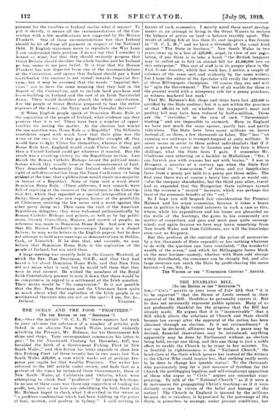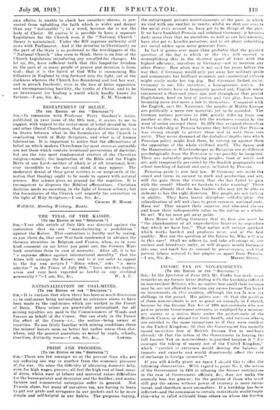THE ENABLING BILL.
lTo THE EDITOR OF THE " SPECTI.TOR."] SIR,—" Civis" asserts in your issue of July 12th that " it is to be regretted" that the House of Lords seemed to show approval of the Bill. Doubtless he personally regrets it. But he does not necessarily represent public opinion. Many of 113 are profoundly thankful for the progress that the Bill has already made. He argues that it is "inconceivable" that a Bill which alters the relations of Church and State should become law except after the approval of the nation has been obtained through an election. Is it not extraordinary? A war can be declared, alliances may be made, a peace may be devised, financial innovations may be introduced, anything apparently may be done by Parliament without an election being held, except one thing, and this one thing is just a noble effort to enable the Church to be truer to her mission. No, so fruitful in righteousness is the "National Church," the bond-slave of the State which ignores her instead of the witness to the Christ Who could inspire her, that nothing really needs to be done to change her ignoble status! To the thousands who passionately long for a just measure of freedom for the Church the pettifogging legalism and self-complacent opposition of those who argue as " Civis" argues are somewhat exas- perating. To talk of the "National Chureh" as if it were a fit instrument for propagating Christ's teaching—as if it were divinely secure by virtue of the belief and homage of the nation! The Church in England is ignored by the millions because she is voiceless, is hypnotized by the patronage of the State, is powerless to manage, under present conditions, her own affairs, is unable to check her countless abuses, is pre- vented from upholding the faith which is wider and deeper than any "nationality"; in a word, because she is not the body of Christ. Of course it is possible to have a separate Legislature for the Church even if the "National Church" theory is maintained. -Under the Bill supreme authority still rests with Parliament. And if the devotion to Christianity on the part of the State is as profound as the worshippers of the "National Church" idea seem to think, there is no fear of the Cifurch Legislature introducing any uncalled-for changes. Do let uS, Sir, have sufficient faith that this longed-for freedom on the part of so many people of prayer and devotion is from God: that it is the Spirit of God Who is summoning His followers in England to step forward into the light, out of the darkness wherein the Church has floundered and lost her way, and to preach fearlessly, even in the face of bitter opposition and uncompromising hostility, the truths of Christ, and to be an instrument for healing a world which hardly knows its



































 Previous page
Previous page